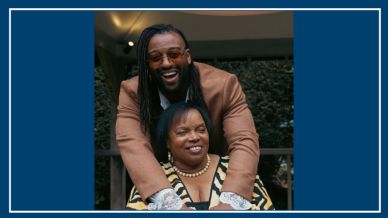Oritsé Williams is best known as the founding member and one quarter of pop group JLS. However away from the spotlight, he’s spent much of his life caring for his mum who was diagnosed with MS when he was just 12 years old.
Here he speaks candidly to the MS Trust about the close relationship he has with his family and the impact of caring for a loved one from such a young age.
My mum was diagnosed with multiple sclerosis when I was 12 years old, which meant a huge role reversal in our relationship. Previously my mum had looked after me, my brother and my sister, but after her diagnosis everything changed. I became her carer and as the oldest child I was essentially the man of the house.
It was tough, my father was travelling a lot, so I had to pick up the reins. For me, it was important to make sure that my little sister and brother took on as little responsibility as possible, I wanted them to have as much of their childhood as they could.
A few years after mum was diagnosed, when I was around 14, I decided with my younger brother that I would become a musician. With the money I earnt from singing, I would give him the money he needed to become a biomedical scientist or doctor. We could then together use the money to find a cure for our mum.
Obviously, I did become a musician and he also graduated in biomedical science. But as you grow up, you begin to understand that things aren’t as straightforward as the fairy tale you imagine as a child, you realise that life isn’t as easy as you thought.
Embracing the role of carer
We didn’t have a great deal of support when mum was diagnosed. There was a person she could contact at the hospital, but responsibility for administering her medication fell to us kids.
My brother was the least squeamish out of us so it was down to him to administer mum’s injections, tasks that should really be for medically trained adults, not children. But we were mum’s army of young carers and just banded together, doing everything we could for her.
Looking beyond the wheelchair
Sometimes when people meet my mum, they just see someone in a wheelchair, or someone who’s got MS. I remind them that her mind is not disabled, I say
You do realise my mum's a law graduate? She's mentally fine!
For my mum she's such a mature, light-hearted person that she doesn't pay too much attention to it. But I like to tell people my mum has all her faculties and is a highly intelligent woman!
I like to remind them to put the person first and the disability second.
In terms of progression, mum has been lucky that’s she’s now stayed at the same level for a long time. But obviously as she’s getting older, I'm seeing more wear and tear, which is difficult to watch. For example, when she eats, she now coughs a lot. I realise it’s neurological and is part of her condition, but it’s hard to watch.
I'm constantly thinking “How am I going to support her in this period of her life?” That question lives with me all the time.
She now needs full time caring support, to cover everything you can think of. This isn’t easy, as a parent or as a human being, we all want to keep as much dignity and independence as possible. We try very hard to ensure mum doesn’t feel like a burden. Even in the way we care for her, if we’re supporting her in the bathroom, we’ll put the radio on and have a sing along to Bob Marley songs!
Over the years her spirit has always remained, which helps us massively, she’s always been very selfless. She’s always said, you know, Oritsé, Temi, and Naomi, “There's people out there that are much worse than me. We have to be grateful.”
Putting MS in the spotlight
It's important to raise awareness of MS, because a lot of people just don't know about the condition. Other illnesses such as cancer and dementia get spoken about a lot, whereas MS just isn’t talked about.
Raising awareness gives people the knowledge to be able to better prepare themselves if a loved one was to be diagnosed. I truly believe that the more we can talk about MS, the more we can make it a focal point in society. We can encourage the government to take action and provide more support for young carers and people living with MS. People living with multiple sclerosis and their families, need more support and we can’t forget that. We want to encourage as much conversation and awareness as possible.



